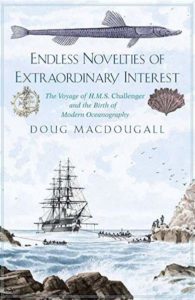 There had never before been anything like the 1870s voyage of the H.M.S. Challenger. From late 1872 to 1876, with the full support of the British navy, and specially refitted as a floating scientific laboratory staffed by some of the empire’s finest naturalists, it sailed the oceans of the planet solely for the purpose of discovering more about what was in them and how the systems they contain function and inter-relate with one another. Needless to note, of course, that given such a team of inquisitive naturalists equipped with the world’s then finest floating laboratory at their disposal, a wide range of other investigations and subsequent discoveries were made as well.
There had never before been anything like the 1870s voyage of the H.M.S. Challenger. From late 1872 to 1876, with the full support of the British navy, and specially refitted as a floating scientific laboratory staffed by some of the empire’s finest naturalists, it sailed the oceans of the planet solely for the purpose of discovering more about what was in them and how the systems they contain function and inter-relate with one another. Needless to note, of course, that given such a team of inquisitive naturalists equipped with the world’s then finest floating laboratory at their disposal, a wide range of other investigations and subsequent discoveries were made as well.
So copious were the discoveries of the expedition that the report published nineteen years following its completion ran to fifty volumes. Now, in Endless Novelties of Extraordinary Interest, Dr. Doug Macdougall, emeritus professor of earth sciences at the Scripps Institution of Oceanography at the University of California, San Diego, and author of such previous books as Nature’s Clocks: How Scientists Measure the Age of Almost Everything and Why Geology Matters: Decoding the Past, Anticipating the Future, recounts the story of this famous expedition, which among many other things effectively established the modern science of oceanography, in a very interesting and widely accessible, single volume work.
